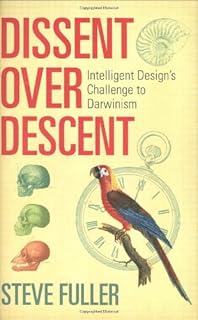 British sociologist Steve Fuller, author of Dissent over Descent, offers some thoughts on the anniversary of the U.S. Dover decision. Fuller has studied the controversy with a view to finding out what is going on, rather than advancing a position in a culture war. Here at Australian Broadcasting Corporation:
British sociologist Steve Fuller, author of Dissent over Descent, offers some thoughts on the anniversary of the U.S. Dover decision. Fuller has studied the controversy with a view to finding out what is going on, rather than advancing a position in a culture war. Here at Australian Broadcasting Corporation:
20 December 2015 marked the tenth anniversary of the judicial verdict of Kitzmiller vs. Dover Area School District, a landmark U.S. case which can be reasonably seen as having stopped the advance of non-Darwinian approaches to biology in state-supported high school classrooms and textbooks.
I have no doubt that such approaches continue to be taught in various guises in various pedagogical contexts. But all these efforts travel under the juridical radar, no longer seeking formal recognition.
One finds it hard to resist (okay, we didn’t try very hard) pointing out that the Royal Society is currently trying to get past Darwin too, and they are not in Judge Jones’s jurisdiction, it turns out. Only 1/3 of Pennsylvania state is, apparently, not that one would know that from the world coverage. Fuller notes,
It also didn’t help that the Discovery Institute pulled out its expert witnesses before the trial started, once it learned that the school board members saw intelligent design as a way to get creationism into the science classes. (Nevertheless, two Discovery Institute fellows testified on their own accord: Michael Behe and Scott Minnich.)
By then I had been on this beat for about four years, and certainly remember how flummoxed they all were. My take is, the DI guys were hostages to someone else’s agenda, and in the end just couldn’t play along. Behe, as it happened, lived in the area, so it made sense for him to say something on his own anyway.*

Fuller believes,
Intelligent design is alive and well, but it has begun the sort of process that normally happens to radical ideas that eventually become assimilated into mainstream inquiry. … While I don’t predict that “intelligent design” will ever name a distinct academic discipline, I’m confident that it will inform many of them – even in the life sciences.
He’s likely right. The alternative would be to claim that information can come into existence randomly and that Darwinian evolution is saving us from a plague of disembodied space brains and other stuff appearing from nowhere.
Integrating information with matter and energy seems like a more science-based approach. Fuller adds,
As for the future: while intelligent design theorists will need to drop their “conservative” pose to consolidate their position with intellectual fellow-travellers, Darwinists will be reaping the whirlwind of atheism as they try to establish a positive world-view.More.
Hard to see how the ID folk’ll get much time for a “conservative pose,” as things stand.
Now, re the whirlwind, see Dawkins walks out on flying horse? But … how did this all get started anyway?
* Behe can’t have expected the “astrology” fark, exploiting the ignorance of the bimbos of legacy media. But it was still early days in their massive decline as sources of information, as opposed to glitz powder-approved opinion.
See also: Dover is over
and
The Dover case, John West, and intelligent design
Follow UD News at Twitter!